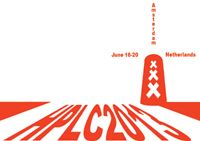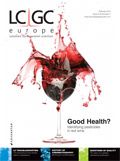Event News: HPLC2013
HPLC2013 red and white image
HPLC2013 will take place at the RAI Conference Centre in Amsterdam from 16–20 June 2013. It is co-chaired by Peter Schoenmakers and Wim Kok from the University of Amsterdam, The Netherlands. HPLC2013 is an international symposium focusing on the latest developments in high performance liquid chromatography (HPLC) and complementary separation techniques such as capillary electrophoresis and supercritical fluid chromatography (SFC). Hyphenated techniques will be covered extensively, as well as the latest developments in microfluidics techniques.

HPLC2013 will cover the most important advances in HPLC technology. This provides valuable resources for separation scientists seeking practical solutions or a better understanding. The symposium will consist of lectures, tutorials, posters, technical seminars and short courses. The lecture programme is divided into three distinct areas: HPLC MS 2013, HYPERformance LC and High Impact LC.
HPLC MS 2013 will focus on liquid chromatography–mass spectrometry (LC–MS). Throughout the symposium, one of the parallel sessions (featuring 18 keynote lectures and 39 submitted oral presentations) will be dedicated to mass spectrometry, including ionization methods, quantitation, LC–MS, CE–MS, LC–MS of small and large molecules and data handling. Special sessions will focus on biomedical and biopharmaceutical applications of LC–MS.
The HYPERformance LC component will consist of 28 keynote lectures and 24 oral presentations focusing on state-of-the-art techniques, applications and theory in the core areas of HPLC from the leading experts in these fields. Topics will include stationary phases, fundamentals, instrumentation, selectivity, electromigration, SFC, chemometrics and LC LC.
High Impact LC will involve 16 keynote lectures, 35 oral presentations and seven discussions and is dedicated to challenging the HPLC community to identify directions of future research and innovation and solve problems that could hinder such advances. There are seven areas that will be investigated: metabolomics, environmental, proteomics, polymers, food, pharmaceutical and forensics. Each section will have an expert who will outline the most important goals in his or her field and how analysis by HPLC can contribute. This is followed by a response on what is currently possible and how this research could possibly develop and the obstacles that need to be overcome. Five speakers will discuss cutting-edge sample-preparation and analysis methods on each subject.
Education is a core concept throughout HPLC2013 and in addition to the comprehensive scientific programme and 21 tutorials there are short courses on Sunday 16 June 2013 covering sample preparation, retention mechanisms, LC–MS, including LC coupled with tandem mass spectrometry (MS–MS) and comprehensive two-dimensional liquid chromatography (LC LC). A stellar cast of chromatographers will be presenting at HPLC2013 and full details can be found at www.hplc2013.org..
The annual Csaba Horváth Award will be at stake for young talented scientists under 35 at the time of their lecture. Last year's winner, Stefan Bruns from Marburg University (Germany), will present in the opening plenary session. A team of experts led by Gerard Rozing will select the best posters. The public may also vote on a popular poster award through a novel high-tech process. All contributing scientists can identify themselves as award candidates when submitting their abstracts. Student grants are available from a number of organizations.
An exhibition of leading HPLC instrument and product vendors is an important part of the HPLC2013 and will run in parallel with the conference. Over 50 exhibiting companies and 1200 participants are expected to attend. There will be approximately 200 oral presentations, 800 posters and seven discussions. Lunches and refreshments are included in the conference fee. All participants can extend their networks by participating in the extensive social programme.
Important deadlines include 1 May 2013 for poster presentations and 1 March 2013 for discounted early bird registration.
Website: www.hplc2013.orgor E-mail:hplc2013@caos.nl
17–21 March 2013
Pittcon 2013 Conference and Exposition
Pennsylvania Convention Centre, Philadelphia, USA
Organizers: The Pittsburgh Conference on Analytical Chemistry and Applied Spectroscopy
Tel: +1 412 8253220
Fax: +1 412 8253224
E-mail: info@pittcon.org
Website: www.pittcon.org
24–25 April 2013
Ion Chromatography 2013
Zabrze, Poland
Organizers: Institute of Environmental Engineering of Polish Academy of Science
Tel: +48 32 2716481
Fax: +48 32 2717470
E-mail: michalski@ipis.zabrze.pl
Website: www.ipis.zabrze.pl/dokumenty/konferencje/2013/IC2013en.pdf
4–6 September 2013
9th Balaton Symposium on HighPerformance Separation Methods
Hotel Azúr, 2/C Erkel F. St, H-8600, Siófok, Hungary
Organizers: Hungarian Society for Separation Scientists
Tel: +36 30 894 0316
E-mail: hoholr@diamond-congress.hu
Website: www.balaton.mett.hu
6–9 October 2013
20th International Symposium on Electro- and Liquid-Phase Separation Techniques, ITP2013
Hotel Beatriz Atlantis & Spa, Puerto de la Cruz, Tenerife, Canary Islands, Spain
Organizers: Spanish National Research Council and the University La Laguna
Tel: +34 922 318990
Fax: +34 922 318003
E-mail: itp2013@ull.es
Website: http://www.itp2013.ull.es
Send any event news to Kate Mosford

Regulatory Deadlines and Supply Chain Challenges Take Center Stage in Nitrosamine Discussion
April 10th 2025During an LCGC International peer exchange, Aloka Srinivasan, Mayank Bhanti, and Amber Burch discussed the regulatory deadlines and supply chain challenges that come with nitrosamine analysis.













